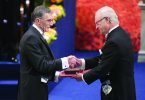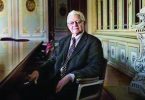The first representative of Film-Makers’ Generation, the master without a master Ömer Lütfi Akad broke grounds in Turkish cinema and set his predecessors an example.
Contributor: AYŞE NUR AZCA Photographs: ISTANBUL MODERN
Referred to as ‘Master without a Master’, Director Ömer Lütfi Akad was born on September 2nd 1916 to a father who migrated to Istanbul from Aleppo and to a mother from İzmit. Akad started his education in French school Sainte Jeanne de Arc and later attended Galatasaray Lycee. He graduated from Istanbul Academy of Economy and Trade, Department of Finance. Lütfi Akad’s career took start in accounting department of Lale Film Company. He took an interest in drama and cinema working as a decorater in community houses. He was featured in various plays as an amateur actor and published a literature magazine with the name Beş Sanat. Great oak of Turkish cinema lead the way with his films. Firstly, he used clear Turkish in his films and adapted various folktales to cinema. Tahir and Zühre, Arzu and Kamber are his folktale adaptations. Secondly he enabled the transition from theatre tradition to cinema technique. Cinema doyen Akad took the first step into cinema as the production director of the film Domaniç Yolcusu. He took the director’s seat for the first time and directed various scenes for the film Damga. Akad adapted famous novel Vurun Kahpeye by Halide Edip Adıvar to cinema and achieved to get the novel across to audience through a dramatic cinema language. Vurun Kahpeye, the first film he made in 1948, was a blockbuster. His second debut was with Beyaz Mendil Yaşar Kemal wrote the screenplay of. Akad, a pioneering figure in many areas of cinema, made his masterpiece Kanun Namına and introduced urban detective film trend to Turkish cinema.
With the prominent trilogy in history of Turkish cinema, films Gelin, Düğün and Diyet director added a dimension to Turkish cinema and in these films he dealt with the issue of internal migration in Turkey. The themes in the trilogy are the problems faced by families who moved to Istanbul. He adapted Ömer Seyfettin’s stories Ferman, Pembe İncili Kaftan, Diyet and Topuz into TV films and made a mark with his documentaries.
One of the first representatives of “Film-makers Generation”, Master without a master influenced his period and the following directors with his original cinema language. Contrary to other directors, he filmed in actual venues instead of using decors and created an awareness in this respect which influenced cinema in every sense. Lütfi Akad, not only remembered as a director in Turkish cinema, also played a role in trainings launched by IGDSA Film Archive. He taught in cinema courses as a teacher. In 1975, he started working as a faculty member in IDGSA Cinema-TV Institute. He was granted the title of honorary professor by Mimar Sinan University in 1997. Famous director who introduced a new dimension to Turkish cinema and made a mark with his numerous films, passed away at his home on November 19th 2011.
FIRST HAND
Suat Köçer
The Identity of Turkish Cinema
Lütfi Akad is a grand master who laid the foundations of the period referred to as “The Period of Film-Makers” in history of Turkish cinema and directed and presented Kanun Namına, the first original film with regard to story, screenplay, characters and technical features (comprehensively). He undoubtedly introduced revolutionary innovations in employing various techniques however what makes Lütfi Akad unique is his sincere efforts to form Turkish cinema’s identity and to develop his country’s authentic cinema language.
Kutu: Lütfi Akad’s Awards
1967 Antalya Golden Orange Film Festival, Best Drama Film 2nd Place Award, Hudutların Kanunu
1968 Antalya Golden Orange Film Festival, Best Film 2nd Place Award, Vesikalı Yârim
1974 Antalya Golden Orange Film Festival, Best Director, Düğün









Leave a Comment